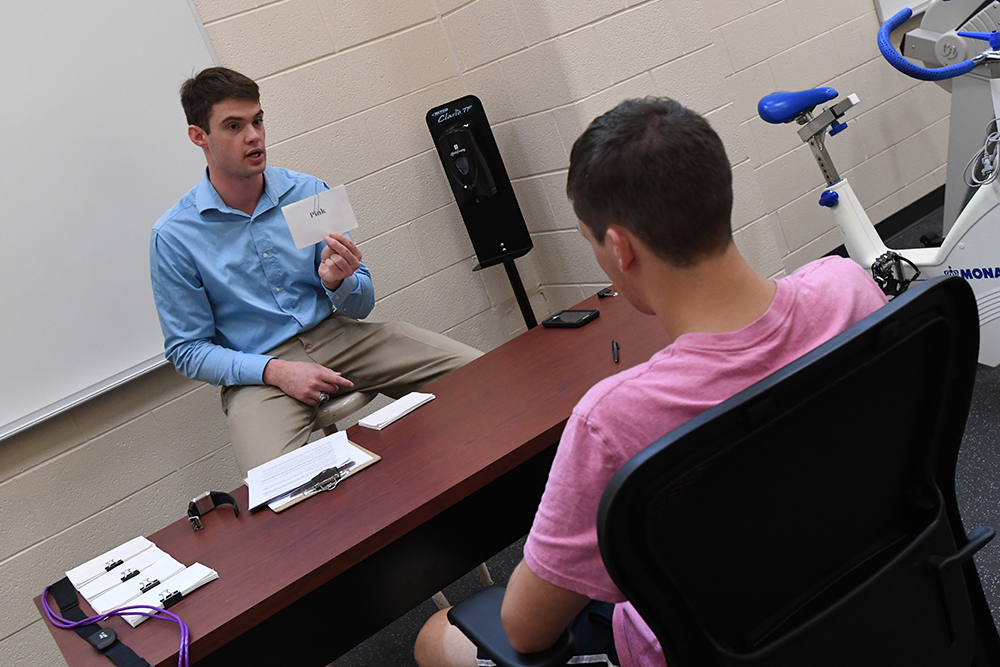2015-2016 | Football Metrics: Playing to Learn
Project Explores How Exercise Affects Self-Control
 |
| Cadet Sam Hudson '17 administers the Stroop test to a research participant. -- VMI Photo by John Robertson IV. |
LEXINGTON, Va., July 18, 2016 – Cadet Samuel Hudson ’17 and Maj. Kristen Rost, assistant professor of psychology, are taking recent research in psychology in a whole new direction this summer in their Summer Undergraduate Research Institute project.
“What’s really important about SURI and really exciting about SURI … is it gives a perspective of what it means to really engage in the research process,” said Rost. “It’s really the complete art of the research process that [Sam] is going through.”
Hudson and Rost spent the first summer session studying how physical exertion affects self-control. He will finish gathering his data in the second summer session and wrap up this month with his final paper.
“I look back at the past month, and it’s just been a whirlwind,” said Hudson, a psychology major with a minor in exercise science. “This has definitely been a really cool experience.”
Hudson, who had been helping Rost with a research project of her own during the academic year, first got the idea for his summer project when he read an article about self-control in a psychology journal.
“Some interesting recent work has shown that glucose levels in the blood actually are related to a person’s level of self-control,” said Rost. “What researchers have shown up to this point is that engaging in tasks that involve self-control or [in] cognitively challenging tasks depletes glucose levels, and that results in impaired self-control later on.”
With his interest in exercise science, Hudson wanted to take that research a step further. He wanted to know if one could decrease those glucose levels in other ways, specifically through physical rather than mental exercise, and still get the same impaired levels of self-control.
“Sam’s question is, ‘Does the nature of that task matter?’” said Rost. “He’s kind of stepping out of that theoretical research a little bit and asking a really fundamental question.”
To test the idea that exercise can influence self-control, Hudson gathered 30 research volunteers whose self-control would be measured via the Stroop test, an exercise in which an individual reads the color of a word instead of the word itself. For example, the word green might appear on an index card in blue type. For a correct response, the test subject would say blue, employing self-control by eschewing the initial desire to read the word. Response time and number of mistakes are combined to form a baseline self-control measure.
The volunteers were divided into equal groups. The members of one group took the test then watched a relaxing video and listened to music while members of the other group spent a minute jumping rope, 20 minutes jogging on a treadmill, and five minutes walking after taking the test.
Then each volunteer took the Stroop test again.
“We’re not seeing what we expected,” said Rost of the results. “For all of our participants we’re seeing a decrease in that self-control measure. Interestingly, the behavior pattern of the data to this point is that [the self-control] of the relaxed group is lower than our exercise group. We can’t really say with the data we have here, but maybe exercise benefits self-control.”
“We know that by engaging in exercise you deplete glucose,” Hudson said. “What we don’t know is whether or not blood glucose is the only thing that is causing self-control to decrease.”
Initial findings, in this study at least, indicate that perhaps blood glucose is not the only factor. Hudson, who plans on heading to Boston, Mass., after graduation for some additional classes before entering medical school in his home state of Texas, hopes to continue the study as part of his capstone project.
“This is the first step toward getting at self-control in a non-psychological way,” he said. “The whole point of the research is to determine what happens and why it’s happening. There are a million and one variables that play in to this.”
“This is a very interesting study,” Rost said, adding that it has generated more questions to answer.
Rost plans to leave VMI after the summer session to take up a position at Troy University in Alabama.
– Chris Floyd
-VMI-
.svg)
.png)